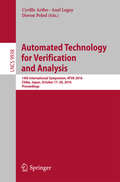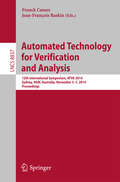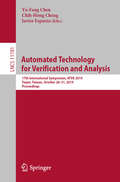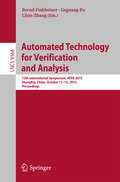- Table View
- List View
Automated Reasoning with Analytic Tableaux and Related Methods: 30th International Conference, TABLEAUX 2021, Birmingham, UK, September 6–9, 2021, Proceedings (Lecture Notes in Computer Science #12842)
by Anupam Das Sara NegriThis book constitutes the proceedings of the 30th International Conference on Automated Reasoning with Analytic Tableaux and Related Methods, TABLEAUX 2021, held in Birmingham, UK, in September 2021.The 23 full papers and 3 system descriptions included in the volume were carefully reviewed and selected from 46 submissions.They present research on all aspects of the mechanization of tableaux-based reasoning and related methods, including theoretical foundations, implementation techniques, systems development and applications. The papers are organized in the following topical sections: tableau calculi, sequent calculi, theorem proving, formalized proofs, non-wellfounded proofs, automated theorem provers, and intuitionistic modal logics.
Automated Reasoning with Analytic Tableaux and Related Methods: International Conference, TABLEAUX 2000 St Andrews, Scotland, UK, July 3-7, 2000 Proceedings (Lecture Notes in Computer Science #1847)
by Roy DyckhoffAutomated Reasoning with Analytic Tableaux and Related Methods: International Conference, TABLEAUX 2002. Copenhagen, Denmark, July 30 - August 1, 2002. Proceedings (Lecture Notes in Computer Science #2381)
by Uwe Egly Christian G. FernmüllerAutomated Reasoning with Analytic Tableaux and Related Methods: 22nd International Conference, TABLEAUX 2013, Nancy, France, September 16-19, 2013, Proceedings (Lecture Notes in Computer Science #8123)
by Didier Galmiche Dominique Larchey-WendlingThis book constitutes the refereed proceedings of the 22th International Conference on Automated Reasoning with Analytic Tableaux and Related Methods, TABLEAUX 2013, held in Nancy, France, in September 2013. The 20 revised research papers presented together with 4 system descriptions were carefully reviewed and selected from 38 submissions. The papers cover many topics as proof-theory in classical and non-classical logics, analytic tableaux for various logics, related techniques and concepts, e.g., model checking and BDDs, related methods (model elimination, sequent calculi, resolution, and connection method), new calculi and methods for theorem proving and verification in classical and non-classical logics, systems, tools, implementations and applications as well as automated deduction and formal methods applied to logic, mathematics, software development, protocol verification, and security.
Automated Reasoning with Analytic Tableaux and Related Methods: 18th International Conference, TABLEAUX 2009, Oslo, Norway, July 6-10, 2009, Proceedings (Lecture Notes in Computer Science #5607)
by Martin Giese Arild WaalerThis volume contains the research papers presented at the International C- ference on Automated Reasoning with Analytic Tableaux and Related Methods (TABLEAUX 2009) held July 6-10, 2009 in Oslo, Norway. This conference was the 18th in a series of international meetings since 1992 (listed on page IX). It was collocated with FTP 2009, the Workshop on First-Order Theorem Proving. The Program Committee of TABLEAUX 2009 received 44 submissions from 24 countries. Each paper was reviewed by at least three referees, after which the reviews were sent to the authors for comment in a rebuttal phase. After a ?nal intensive discussion on the borderline papers during the online meeting of the Program Committee, 21 research papers and 1 system description were accepted based on originality, technical soundness, presentation, and relevance. Additionally,three positionpaperswereaccepted,whicharepublished asate- nical report of the University of Oslo. We wish to sincerely thank all the authors who submitted their work for consideration. And we would like to thank the Program Committee members and other referees for their great e?ort and p- fessional work in the review and selection process. Their names are listed on the following pages.
Automated Reasoning with Analytic Tableaux and Related Methods: International Conference, TABLEAUX 2003, Rome, Italy, September 9-12, 2003. Proceedings (Lecture Notes in Computer Science #2796)
by Marta Cialdea Mayer Fiora PirriThis book constitutes the refereed proceedings of the International Conference on Automated Reasoning with Analytic Tableaux and Related Methods, TABLEAUX 2003, held in Rome, Italy in September 2003. The 20 revised full papers presented were carefully reviewed and selected for inclusion in the book. All current issues surrounding the mechanization of logical reasoning with tableaux and similar methods are addressed in the context of a broad variety of logic calculi.
Automated Reasoning with Analytic Tableaux and Related Methods: International Conference, TABLEAUX'99, Saratoga Springs, NY, USA, June 7-11, 1999, Proceedings (Lecture Notes in Computer Science #1617)
by Neil V. MurrayAutomated Reasoning with Analytic Tableaux and Related Methods: 24th International Conference, TABLEAUX 2015, Wroclaw, Poland, September 21-24, 2015, Proceedings (Lecture Notes in Computer Science #9323)
by Hans De NivelleThis book constitutes the refereed proceedings of the 24th International Conference on Automated Reasoning with Analytic Tableaux and Related Methods, TABLEAUX 2015, held in Wroclaw, Poland, in September 2015. The 19 full papers and 2 papers presented in this volume were carefully reviewed and selected from 34 submissions. They are organized in topical sections named: tableaux calculi; sequent calculus; resolution; other calculi; and applications.
Automated Reasoning with Analytic Tableaux and Related Methods: 16th International Conference, TABLEAUX 2007, Aix en Provence, France, July 3-6, 2007, Proceedings (Lecture Notes in Computer Science #4548)
by Nicola OlivettiThis book constitutes the refereed proceedings of the 16th International Conference on Automated Reasoning with Analytic Tableaux and Related Methods, TABLEAUX 2007, held in Aix en Provence, France. It covers the wide range of logics, from intuitionistic and substructural logics to modal logics (including temporal and dynamic logics), from many-valued logics to nonmonotonic logics, and from classical first-order logic to description logics.
Automated Reasoning with Analytic Tableaux and Related Methods: 32nd International Conference, TABLEAUX 2023, Prague, Czech Republic, September 18–21, 2023, Proceedings (Lecture Notes in Computer Science #14278)
by Revantha Ramanayake Josef UrbanThis open access book constitutes the proceedings of the proceedings of the 32nd International Conference on Automated Reasoning with Analytic Tableaux and Related Methods, TABLEAUX 2023, held in Prague, Czech Republic, during September 18-21, 2023. The 20 full papers and 5 short papers included in this book together with 5 abstracts of invited talks were carefully reviewed and selected from 43 submissions. They present research on all aspects of the mechanization of reasoning with tableaux and related methods. The papers are organized in the following topical sections: tableau calculi; sequent calculi; theorem proving; non-wellfounded proofs; modal logics; linear logic and MV-algebras; separation logic; and first-order logics.
Automated Reasoning with Analytic Tableaux and Related Methods: 26th International Conference, TABLEAUX 2017, Brasília, Brazil, September 25–28, 2017, Proceedings (Lecture Notes in Computer Science #10501)
by Renate A. Schmidt Cláudia NalonThis book contains the proceedings of the 26th International Conference on Automated Reasoning with Analytics Tableaux and Related Methods, TABLEAUX 2017, held in Brasília, Bazil, in September 2017. The 19 contributed papers presented in this volume were carefully reviewed and selected from 27 submissions.They are organized in topical sections named: Sequent systems; tableaux; transitive closure and cyclic proofs; formalization and complexity. Also included are papers of three invited speakers.
Automated Reasoning with Analytic Tableaux and Related Methods: International Conference, TABLEAUX'98, Oisterwijk, The Netherlands, May 5-8, 1998, Proceedings (Lecture Notes in Computer Science #1397)
by Harrie De SwartAutomated Technology for Verification and Analysis: 14th International Symposium, ATVA 2016, Chiba, Japan, October 17-20, 2016, Proceedings (Lecture Notes in Computer Science #9938)
by Cyrille Artho Axel Legay Doron PeledThis book constitutes the proceedings of the 14th International Symposium on Automated Technology for Verification and Analysis, ATVA 2016, held in Chiba, Japan, in October 2016.The 31 papers presented in this volume were carefully reviewed and selected from 82 submissions. They were organized in topical sections named: keynote; Markov models, chains, and decision processes; counter systems, automata; parallelism, concurrency; complexity, decidability; synthesis, refinement; optimization, heuristics, partial-order reductions; solving procedures, model checking; and program analysis.
Automated Technology for Verification and Analysis: 12th International Symposium, ATVA 2014, Sydney, Australia, November 3-7, 2014, Proceedings (Lecture Notes in Computer Science #8837)
by Franck Cassez Jean-François RaskinThis book constitutes the proceedings of the 12th International Symposium on Automated Technology for Verification and Analysis, ATVA 2014, held in Sydney, Australia, in November 2014.The 29 revised papers presented in this volume were carefully reviewed and selected from 76 submissions. They show current research on theoretical and practical aspects of automated analysis, verification and synthesis by providing an international forum for interaction among the researchers in academia and industry.
Automated Technology for Verification and Analysis: 17th International Symposium, ATVA 2019, Taipei, Taiwan, October 28–31, 2019, Proceedings (Lecture Notes in Computer Science #11781)
by Yu-Fang Chen Chih-Hong Cheng Javier EsparzaThis book constitutes the refereed proceedings of the 17th International Symposium on Automated Technology for Verification and Analysis, ATVA 2019, held in Taipei, Taiwan in October 2019.The 24 regular papers presented together with 3 tool papers were carefully reviewed and selected from 65 submissions. The symposium is dedicated to the promotion of research on theoretical and practical aspects of automated analysis, verification and synthesis by providing a forum for interaction between the regional and the international research communities and industry in the field. The papers focus on cyber-physical systems; runtime techniques; testing; automata; synthesis; stochastic systems and model checking.
Automated Technology for Verification and Analysis: 13th International Symposium, ATVA 2015, Shanghai, China, October 12-15, 2015, Proceedings (Lecture Notes in Computer Science #9364)
by Bernd Finkbeiner Geguang Pu Lijun ZhangThis book constitutes the proceedings of the 13th International Symposium on Automated Technology for Verification and Analysis, ATVA 2015, held in Shanghai, China, in October 2015. The 27 revised papers presented together with 6 tool papers in this volume were carefully reviewed and selected from 95 submissions. They show current research on theoretical and practical aspects of automated analysis, verification and synthesis by providing an international forum for interaction among the researchers in academia and industry.
Automated Technology for Verification and Analysis: 16th International Symposium, ATVA 2018, Los Angeles, CA, USA, October 7-10, 2018, Proceedings (Lecture Notes in Computer Science #11138)
by Shuvendu K. Lahiri Chao WangThis book constitutes the refereed proceedings of the 24th International Symposium on Automated Technology for Verification and Analysis, ATVA 2018, held in Los Angeles, CA, USA in October 2018.The 27 full papers presented together with 5 short papers and 3 invited talks were carefully reviewed and selected from 82 submissions. The symposium is dedicated to the promotion of research on theoretical and practical aspects of automated analysis, verification and synthesis by providing a forum for interaction between the regional and the international research communities and industry in the field.
Automated Technology for Verification and Analysis: 7th International Symposium, ATVA 2009, Macao, China, October 14-16, 2009, Proceedings (Lecture Notes in Computer Science #5799)
by Zhiming Liu Anders P. RavnThis book constitutes the proceedings of the 7th International Symposium on Automated Technology for Verification and Analysis, ATVA 2009, held in Macao, China, in October 2009. The 23 regular papers and 3 took papers presented together with 3 invited talks, were carefully reviewed and selected from 74 research papers and 10 tool papers submissions. The papers are organized in topical sections on state space reduction, tools, probabilistic systems, medley, temporal logic, abstraction and refinement, and fault tolerant systems.
Automated Theorem Proving (Künstliche Intelligenz)
by Wolfgang BibelSince both the coments and the structure of the book appeared to be successful, only minor changes were made. In particular, some recent work in ATP has been incorporated so that the book continues to reflect the state of the art in the field. The most significant change is in the quality of the layout including the removal of a number of inaccuracies and typing errors. R. Caferra, E. Eder, F. van der Linden, and J. Muller have caught vanous minor errors. P. Haddawy and S.T. Pope have provided many stilistic improvements of the English text. Last not least, A. Bentrup and W. Fischer have produced the beautiful layout. The extensive work of typesetting was financally supported within ESPRIT pro ject 415. Munchen, September 1986 W. Bibel PREFACE Among the dreams of mankind is the one dealing with the mechanization of human thought. As the world today has become so complex that humans apparently fail to manage it properly with their intellectual gifts, the realization of this dream might be regarded even as something like a necessity. On the other hand, the incredi ble advances in computer technology let it appear as a real possibility.
Automated Theorem Proving: Theory and Practice
by Monty NewbornThis text and software package introduces readers to automated theorem proving, while providing two approaches implemented as easy-to-use programs. These are semantic-tree theorem proving and resolution-refutation theorem proving. The early chapters introduce first-order predicate calculus, well-formed formulae, and their transformation to clauses. Then the author goes on to show how the two methods work and provides numerous examples for readers to try their hand at theorem-proving experiments. Each chapter comes with exercises designed to familiarise the readers with the ideas and with the software, and answers to many of the problems.
Automated Theorem Proving in Software Engineering
by Johann M. SchumannGrowing demands for the quality, safety, and security of software can only be satisfied by the rigorous application of formal methods during software design. This book methodically investigates the potential of first-order logic automated theorem provers for applications in software engineering. Illustrated by complete case studies on protocol verification, verification of security protocols, and logic-based software reuse, this book provides techniques for assessing the prover's capabilities and for selecting and developing an appropriate interface architecture.
Automatentheorie und Logik (eXamen.press)
by Martin Hofmann Martin LangeDas Buch beschäftigt sich mit der Theorie endlicher Automaten und den klassischen Resultaten wie den Sätzen von Richard Büchi und Michael Rabin. Die vier Teile des Buchs sind den unterschiedlichen Strukturen gewidmet: endliche Wörter, Bäume, endliche und unendliche Bäume. Jeder Teil endet mit Übungsaufgaben zum behandelten Stoff sowie Hinweisen auf weiterführende Literatur. Soweit Vorkenntnisse zur Theorie formaler Sprachen vorhanden sind, kann das Buch ohne weitere Hilfsmittel durchgearbeitet werden.
Automation and Autonomy: Labour, Capital and Machines in the Artificial Intelligence Industry (Marx, Engels, and Marxisms)
by James SteinhoffThis book argues that Marxist theory is essential for understanding the contemporary industrialization of the form of artificial intelligence (AI) called machine learning. It includes a political economic history of AI, tracking how it went from a fringe research interest for a handful of scientists in the 1950s to a centerpiece of cybernetic capital fifty years later. It also includes a political economic study of the scale, scope and dynamics of the contemporary AI industry as well as a labour process analysis of commercial machine learning software production, based on interviews with workers and management in AI companies around the world, ranging from tiny startups to giant technology firms. On the basis of this study, Steinhoff develops a Marxist analysis to argue that the popular theory of immaterial labour, which holds that information technologies increase the autonomy of workers from capital, tending towards a post-capitalist economy, does not adequately describe the situation of high-tech digital labour today. In the AI industry, digital labour remains firmly under the control of capital. Steinhoff argues that theories discerning therein an emergent autonomy of labour are in fact witnessing labour’s increasing automation.
Automation and Human Solidarity
by Bill JordanThis book provides a detailed analysis of the economic and political implications of the introduction of Artificial Intelligence and Robotics into the service sector of economies that have so far relied on service jobs to sustain levels of employment. It examines how reliance on coercive measures for enforcing low-paid service work attempts to postpone this third Industrial Revolution, and analyses the struggles that must still take place if we are to achieve a future of freedom and social justice for all. While automation and globalisation have made human solidarities of traditional kinds more difficult to sustain, they have also made new kinds possible. Experiments in social policy, and especially the pilot projects with unconditional Universal Basic Incomes, offer a possible model for a new kind of society. The author argues that it is politics which will determine whether we can achieve these new human solidarities.
Automation and Utopia: Human Flourishing in a World without Work
by John DanaherAutomating technologies threaten to usher in a workless future, but John Danaher argues that this can be a good thing. A world without work may be a kind of utopia, free of the misery of the job and full of opportunities for creativity and exploration. If we play our cards right, automation could be the path to idealized forms of human flourishing.
























